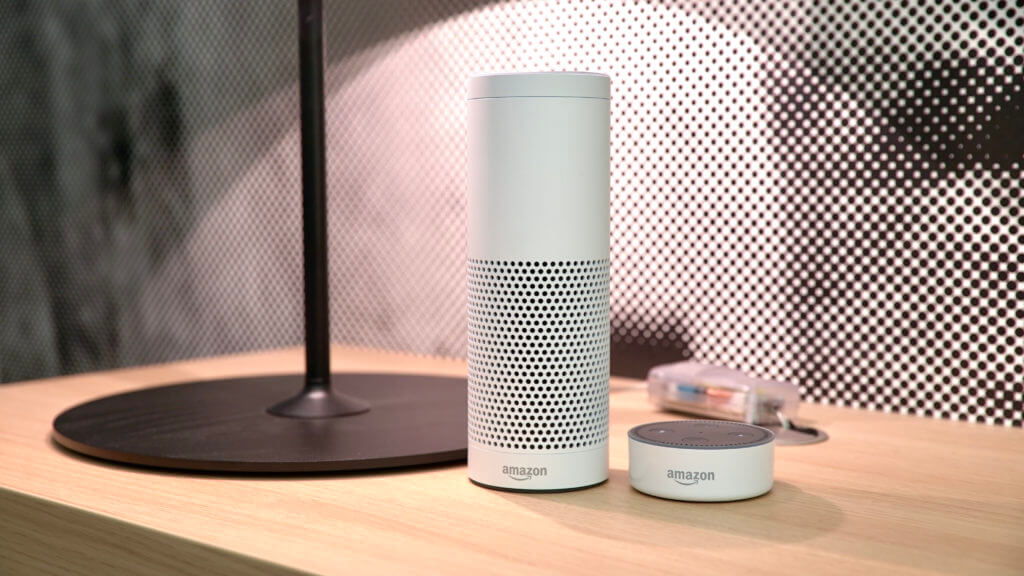Alexa, a voice in a can

I say, Hey! You! Get off of my cloud
Hey! You! Get off of my cloud
Don’t hang around ‘cause two’s a crowd
~ The Rolling Stones, “Get Out of My Cloud,” –
HAL (the Heuristically programmed ALgorithmic Computer), that eye in space in Stanley Kubrick’s late 1960s film 2001: A Space Odyssey introduced many of us to the robotic realm of the future, in which mechanically developed devices took on human traits and, for some of us, suggested that there was more to our universe than mankind and Earth.
Well, those thoughts came home to me again this last weekend when I visited my twin grandsons for their 11th birthday. My thoughts were driven by presents from their other grandparents, who presented each with “Alexa.” For those of you who have not met her yet, Alexa talks like a human, sounds like someone on the phone, understands questions and accesses a trove of information about a wide variety of subjects from music to politics to places to be and to eat. I was shocked at how she answered our questions on virtually every topic we asked her. If she herself did not know the answer, she knew where to send us for it. She did not look human (more like a Christmas candle), but she certainly talked it.
So, what does Alexa have to do with the future of humanity? An article in the September 10 New York Times says, “These Are Not the Robots We Were Promised.” Those expected were more mechanical than intellectual. These, on the other hand, bring brains, not brawn, to the world. According to Nicholas Carr, author of the article, Alexa’s cones will soon be scattered around our houses, and we will be able to converse with “solicitous A.I. assistants wherever and whenever we like.”
I saw the ease with which the young generation deals with mechanic-speak. For them, Alexa was just another voice of nature. For me, she was a “thing” outside of the natural world in which I had grown up. She was placing me in a virtual world that re-distributed humanity among the other objects of the universe.
For millennia, human beings felt that we had been centerpieces of a universal order designed by a god who, in point of fact, we designed ourselves to make other things, other animals and beings secondary to humanity. Human cultures, regardless of their beliefs, were what guided politics, development, physical layout of lands. Could we, the immigrants to this country, have learned more from the “Native Americans,” some of the most interactive people in mankind? The Indians practiced cooperation. They paired with the buffalo and other animals to share properties of earth that benefited each species. Chief Luther Standing Bear of the Oglala Sioux said, “Only to the white man was nature a wilderness.” To the Sioux it was bountiful, and they were surrounded by the blessings of “The Great Mystery.”
Some of my favorite authors recognized this, I believe, as well. Annie Dillard wrote of her strong interactions with her immediate world in Pilgrim on Tinker Creek. Norman MacLean explored the relationship between religion and fly-fishing, particularly in his short story, “A River Runs Through It.” In its final lines he says he is “haunted by waters.” The world around him merges into one existence and “a river runs through it.”
But now the question becomes, where will Alexa take us? Yes, there still will be Tinker Creeks, and, yes, fly-fishing in America will still cause what some feel is an interpersonal interaction between fish and the person designing the bait and holding the rod.
Alexa, however, brings an entirely new element into human nature’s way of being in this world. We have added a thing that causes us to respond more virtually than we ever have before. What Alexa does is what our nervous system alone (we thought) did. Our physical parts caused us to respond “fluidly to an ever-changing environment,” according to author Carr. Now we have added an electronic or at least an other-than-physical gadget to our repertoire. These gadgets are designed to help us interface with the world. Maybe they do that. However, they also add elements of technology that expand humanity beyond ourselves and take away much of our human interaction.
In previous OutTakes I have mentioned my observations of people walking together and not interacting because each is on a cellphone to someone elsewhere. Well, that someone else has been replaced by an AI-bred voice coming through a cone sounding as human as possible so that we will be misled into thinking there is an actual voice box speaking. Unfortunately, I believe it is helping us become more self-absorbed.
It is not yet replacing our president’s inclination to communicate largely through tweets, but if we become accustomed enough to talking through Alexa, we may elect the first cone to the White House. It may not be, however, any worse than our current attempted-oligarch who wishes he still had blond hair and could salute as he walks across the White House lawn with any meaning to the gesture for him. Imagine flying off to Mar-a-Lago leaving Alexa in Washington to “Trumpticate” Congress.

